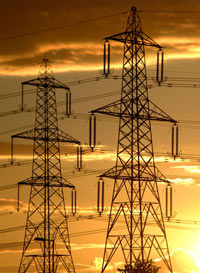Utility outage emergency preparedness

Utility outages in our region are typically related to high winds and should be prepared for like any other potential emergency. Most of our natural gas infrastructure is located underground, making it more vulnerable to earthquake, landslide, or third party damage, such as excavation projects. Most power lines are above ground, making them more susceptible to severe weather conditions and interference from trees and other vegetation.
Power failures are particularly critical at sites where the environment and public safety are at risk. Institutions such as hospitals and sewage treatment plants usually have backup power sources which automatically start up when electrical power is lost.
Restoring power after a wide-area outage can be difficult, as power stations need to be brought back on-line. Normally, this is done with the help of power from the rest of the grid.
Prepare for a power outage
- Be sure your emergency kit includes a flashlight, extra batteries, and cash. (ATMs can't operate without electricity.)
- Keep your mobile phone charged.
- Have alternative charging methods for your phone and other devices.
- Install surge protectors and/or battery back-up systems for computers.
- If you have an electric garage door opener, know where the manual release lever is located and how to operate it.
- Keep your car's gas tank at least half full. (Gas stations rely on electricity to power their pumps.)
- Consider purchasing a generator. If you a have a generator, strictly adhere to safety requirements to avoid carbon monoxide poisoning.
- If you rely on anything that is power dependent, such as a medical device, determine a back-up plan.
- Keep trees and shrubbery trimmed. Make trees more wind resistant by removing diseased or damaged limbs, and strategically removing branches so the wind can blow through.
What to do during a power outage
- To report a power outage:
- Seattle residents call Seattle City Light at 206-684-3000 (customer service) or 206-684-7400 (recorded hotline).
- All other King County residents call Puget Sound Energy at 1-888-225-5773 or complete an online report.
- Use battery-operated light sources such as flashlights or chemically-activated light sticks.
- Do not use candles, as they can cause fires.
- Never use gas ovens, gas ranges, barbecues, or propane heaters for indoor heating. Doing so can lead to carbon monoxide poisoning. These can also increase the risk of fire.
- Limit the number of times you open the refrigerator and freezer to help keep foods cold for longer.
- Turn off as many lights and other electrical items as possible (except for the refrigerator and freezer). This will help eliminate potential fire hazards and reduce the power draw when service is restored.
- Unplug computers and other sensitive equipment to protect them from power surges when service is restored.
- Stay away from downed power lines and sagging trees with broken limbs.
- Stay informed. If available, monitor local media for updates and important safety information.
- If driving, proceed with caution and treat intersections with non-working traffic lights as a four-way stop.
 Translate
Translate